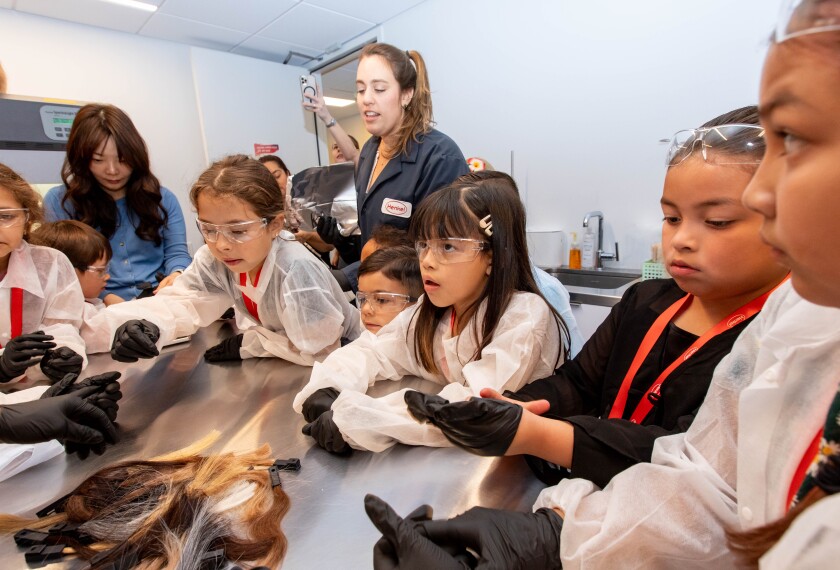A rich new set of survey data on math and science teachers highlights some big challenges the nation faces if it hopes to significantly increase student achievement in those disciplines. It also drives home, experts say, the huge need to support teachers as districts begin implementing the common-core math standards, and as an effort to develop common standards for science nears completion.
Just one-third of middle school math teachers have a degree in mathematics or math education, for instance, according to the national survey of nearly 7,800 educators, including elementary teachers as well as secondary math and science teachers, issued last month. Fewer than half of elementary teachers feel “very well prepared” to teach science. And just one in five K-3 educators teaches science every day.
Meanwhile, a lot of teachers don’t feel well-equipped to plan instruction that meets the needs of students at varying levels of math and science understanding. Also, many don’t place a high priority on asking students to explain and justify their method for solving a math problem, or to supply evidence in support of a scientific claim, approaches emphasized in the new math standards and the ones forthcoming in science.
Those are just a few findings experts are emphasizing in the report, which provides a wealth of information, including teachers’ backgrounds, instructional practices, beliefs, and professional-development experiences. The study was conducted by Horizon Research Inc., based in Chapel Hill, N.C., with support from the National Science Foundation. It has been conducted several times since 1977, last in 2000.
“What I took away is that we have a lot of work to do in reorienting what we’re doing in the classroom to achieve the [vision] of the common core, particularly the standards for mathematical practice,” said W. Gary Martin, a professor of math education at Auburn University in Auburn, Ala. “We’re still heavily focused on more procedural goals, more about the content than building the understanding and reasoning abilities.”
The common core’s eight math-practice standards include making sense of problems and persevering in solving them, constructing viable arguments and critiquing the reasoning of others, and reasoning abstractly and quantitatively.
Fewer than half the teachers surveyed said they feel “very well prepared” to plan math or science instruction so that students at different achievement levels can improve their understanding. Fewer than one-quarter report having high confidence in their ability to teach math or science effectively to English-language learners or students with learning disabilities.
“It sends a message: Let’s be aware of the student population, do a better job of preparing teachers to deal with lots of needs,” said Francis “Skip” Fennell, an education professor at McDaniel College in Westminster, Md., and a former president of the National Council of Teachers of Mathematics. “We have to continually attend to those issues in the implementation of a [common-core-focused] curriculum that is deeper, more challenging, and implies that teachers have that content and pedagogical background.”
Evidence and Explanations
Brian J. Reiser, a professor of learning sciences at Northwestern University in Evanston, Ill., said he was especially struck by what the report reveals about how teachers approach instruction.
“There is a lot of explaining science ideas to the whole class, where the teacher is doing the explaining,” said Mr. Reiser, who served on a National Research Council panel that crafted a framework for the Next Generation Science Standards being developed by 26 states. “And compare that to requiring students to supply evidence in support of their claims,” he said, as the new science standards will emphasize. “That is dramatically different.”
Fewer than 20 percent of the high school science teachers surveyed say they require students in all or most lessons to supply evidence in support of scientific claims, while virtually all explain concepts to their students every day.
“The whole point of involving kids in the deeper learning called for in the [draft] science standards is to involve them in constructing explanations and arguing from evidence to tease out scientific ideas,” Mr. Reiser said. “I’m not opposed to teachers explaining, but that is not the only thing that should be going on.”
Mr. Reiser also was troubled by data showing that fewer than half of teachers at all levels include a “heavy emphasis” on real-world applications of science. At high school, the figure was just 29 percent. “We want kids to understand the basic science, but we want teachers to see the applications as really key,” he said.
Auburn’s Mr. Martin lamented the emphasis among many teachers on starting a math lesson by explaining a concept and then assigning an activity to reinforce it, a strategy also popular for science.
“It goes back to an approach that goes in the opposite direction of reasoning and sense-making,” he said, as the common core promotes.
Another issue the report identifies was how little time science gets in the early grades. Averaged across a week, it amounts to 19 minutes a day in grades K-3, compared with about 90 minutes for reading/language arts and 54 for math.
“We have to get more time for science,” Mr. Reiser said.




